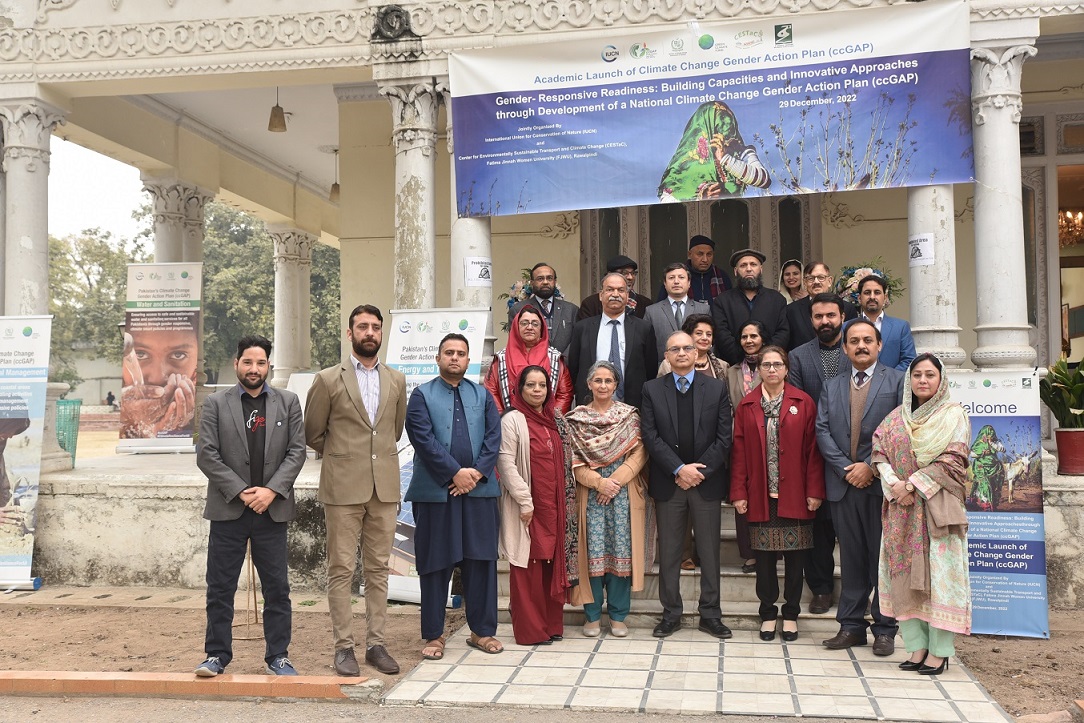Navigating Towards Resilience: Group Discussion on Climate Change and its Impacts on DRR organised by IUCN at Expo on PEDRR
An insightful Group Discussion on 'Climate Change and its Impacts on DRR' was held at the Pakistan Expo on Disaster Risk Reduction 2023 in Islamabad. The experts and enthusiasts came together to delve into the critical intersection of climate change and disaster risk reduction. They agreed to collaborate and drive meaningful action to build a resilient future for Pakistan.
In his opening remarks, Mr. Mahmood Akhtar Cheema, Country Representative IUCN Pakistan, provided an overview of Pakistan's climate situation and the significant disasters experienced, particularly in the past year. The devastating floods wreaked havoc in two major provinces: Sindh and Baluchistan. He emphasized the urgency of adopting a collaborative approach, which is crucial at this juncture. While development partners are currently working individually, combining their resources could yield tangible results on the ground. He underlined that Pakistan’s climate change gender action plan includes a dedicated section on Disaster Risk Reduction, and now is the opportune moment to unite efforts for its practical implementation. He also emphasized the introduction of biodiversity credits in Pakistan.
Dr. Ghulam Rasool, senior expert on Climate Change, delivered an extensive presentation that paved the way for an engaging group discussion. The presentation was rich in detail and comprehensive in scope, serving as a catalyst for the audience to delve into meaningful conversations. This interactive session revolved around five pivotal questions that were strategically designed to stimulate brainstorming among the participants.
The engaging dialogue that followed the presentation enabled the participants to collectively analyse and address the challenges and opportunities associated with climate change and disaster risk reduction in Pakistan. It promoted the exchange of innovative ideas, best practices, and potential solutions, enriching the overall discourse.
As the discussion commenced, it became evident that Pakistan's geographical and climatic diversity presented a complex array of disaster risks, including floods, earthquakes, droughts, and landslides. Participants emphasized that a proactive approach was imperative, one that focused on pre-emptive measures, early warning systems, and community engagement. It was underscored that any sustainable risk reduction strategy must stem from the grassroots level.
Mr. Ali Tauqeer Sheikh, senior expert on climate change informed the participants about flood stricken districts of Balochistan which are still lacking support from the provincial disaster management authority because of lack of funding.
Representing NDRMF, Mr. Muhammad Fawad Hayat, Head Climate Change highlighted the fact that, "Policy and frameworks needs to be implemented to build resilience. There is increase in number of disasters and hazards due to climate change impacts, which is affecting financial and fiscal space of countries across the globe. Strategic interventions play an important role, timely implementation of these interventions is the key, to reduce the gap of cost being incurred due to hazard and vulnerability."
In his concluding remarks, Prof. Dr. M. Iqbal Choudhary, Coordinator General COMSTECH shed light on the way ahead, emphasizing collaboration, community engagement, technology incorporation, and policy adjustments. He underscored that disaster risk reduction transcends the obligations of governments and institutions; it's a shared responsibility encompassing all societal sectors.
Senior experts in climate change, delegates from national and provincial disaster management authorities, prominent development professionals, international development partners, and academic representatives participated in the event.


